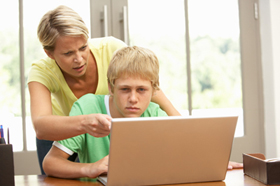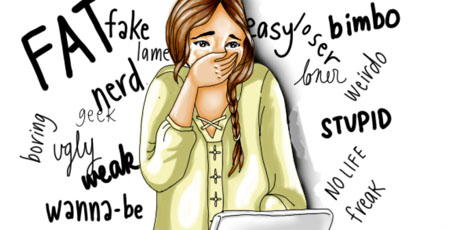7 Essential Lessons on Social Media Awareness for Young Teens, Parents & Teachers
The Internet is great. Like, really great. There is so much to see, share and laugh about. It is your best friend when doing research and completing homework. It allows you to connect with friends and family all over the world! That is a good thing.
However, it is a bit like opening the front door of your house. While we trust many who may come through it, it is hard to control who may simply walk in and bring all sorts of bad things with them.
Access to the Internet has exposed many of you to mature and often inappropriate subject matter and bullying that affects your self-image and possibly your mental health. That is not a good thing.

Educating not only you on how to best use the Internet and specifically, social media, but your parents and teachers as well will help everyone have a more realistic and productive view of what is being accessed, and understanding what impact it may have.
Staying safe online – what every young teen needs to know about Social Media Share on XSeven Essential Lessons on Social Media Awareness
7 things you need to know before signing up for social media accounts:
- Are you 13 years old? Most sites like Facebook, Twitter, SnapChat, WhatsApp, and Instagram require all people signing up for their service to be 13 years old. They each claim to use ‘age screening’ to ensure all members are of age.
- Know what you want to do, and what you want to share. Are you just chatting with friends or looking to share events in your life. Each App has a unique focus and intent. Talk to your friends about what they are using and what works.
- Your information may not be private. Read the privacy settings and understand what you are agreeing to upon setting up an account. Most social media service providers do not disclose their privacy settings clearly or simply. (For an example of the simplified version of Instagram Terms of Use: see Page 10 of this Report)
- Only share your information with trusted people. Do not accept friend requests or personal information requests from anyone you do not know personally.
- Never post personal information, like your phone number, address or full name. Never post inappropriate photos of yourself, ever. These details will allow a predator to find out a great deal about you and your habits.
- Your parents are smarter than you think. Talk with them about what you want to do and get their opinion. They only want you to be safe and are not out to simply spoil your fun.
- Remember that all social media Apps are like any tool. How you use it is how you will find it useful.
Managing activity, as a parent
Keeping up with the newest social media tool can be crazy and frustrating. It seems every day some new App is released to allow your children to send pics, share information and chat non-stop.

While smartphones are often issued to teens for their personal safety, they are often the tools for many social media accounts for them to use. What happens on those phones is often hidden from the parents.
In reality, a parent has the right to observe all activity on their child’s phone. They are, usually paying the bill after all! This is also true for any home computer. Checking the browsing history, or looking at chat sessions is important.

This often counters the degree of trust a parent wants to have with you, but trust is earned. Once you prove you are responsible on social media, only then you can have privacy. One way to keep an eye on activity, is to have the home computer in an open space, like the den or living room, not behind closed doors.
Parents also need to explain to you all about privacy and social media – so you understand what you are allowing companies to see, and what you may be allowing others to know about you and to explain to you about on-line predators and other known threats.
What every child, parent and teacher needs to know about social media Share on XTeaching social media responsibility, as a teacher
Your teachers may already be using social media as a teaching tool – to post homework assignments on Blog sites, use Twitter to remind you of deadlines and classroom activities. They can also use social media to connect with other schools or countries to show how it can be used as a valuable learning tool.
By using proven experiments like posting a sign on Facebook with the school’s name and date, then asking it to be shared, shows you and your fellow students how quickly an image can travel across the Internet, and for how long it will remain available for all to see. It is often asked, ‘Are we opening up a whole dangerous world to our students once they are writing online and posting comments to each other?’

It is up to your teacher, or the school curriculum to decide how to responsibly and proactively manage social media in your classroom. There must be a long-term plan with checks and balances along the way – so you and your fellow students are protected at all times.
Your teachers can also explain to your classroom the dangers and effects of cyberbullying by explaining what will happen to bullies, both legally and socially.
Cyberbullying has been a topic in the news lately as it has had sometimes lethal results. Most schools have taken on a zero-tolerance on all forms of cyber bullying. There are also legal ramifications for all cyberbullies.

If cyberbullies breach the terms and conditions of the social media provider, their accounts will be suspended. If they post inappropriate images, they may be charged with child pornography and deemed a sexual predator and be on a national sex offender registry for life – unable to get a job or hold any trusted position.
Things to think about before using social media – quick lesson for teens, parents and teachers Share on XThe long-term risk of social media – is it making you anti-social?
While you are interacting more than ever through social media, you may be interacting less and less in person.
Being Internet and social media savvy will definitely help you in your later career, but you also do have to have adequate social skills and be able to spell, beyond chat acronyms and obliterating all your excess vowels and consonants!

The ability to relay the tone and intent of a comment on-line is often lost when you cannot see someone’s face and body language. Sometimes when we read something written on a screen it sounds a certain way in our head, but that is not necessarily how it was intended to sound. Responsiveness and lively interaction is in danger of being lost in this ‘one click away’ world we now all live in.
Is social media creating anti-social youth? 7 valuable lessons. Share on X










